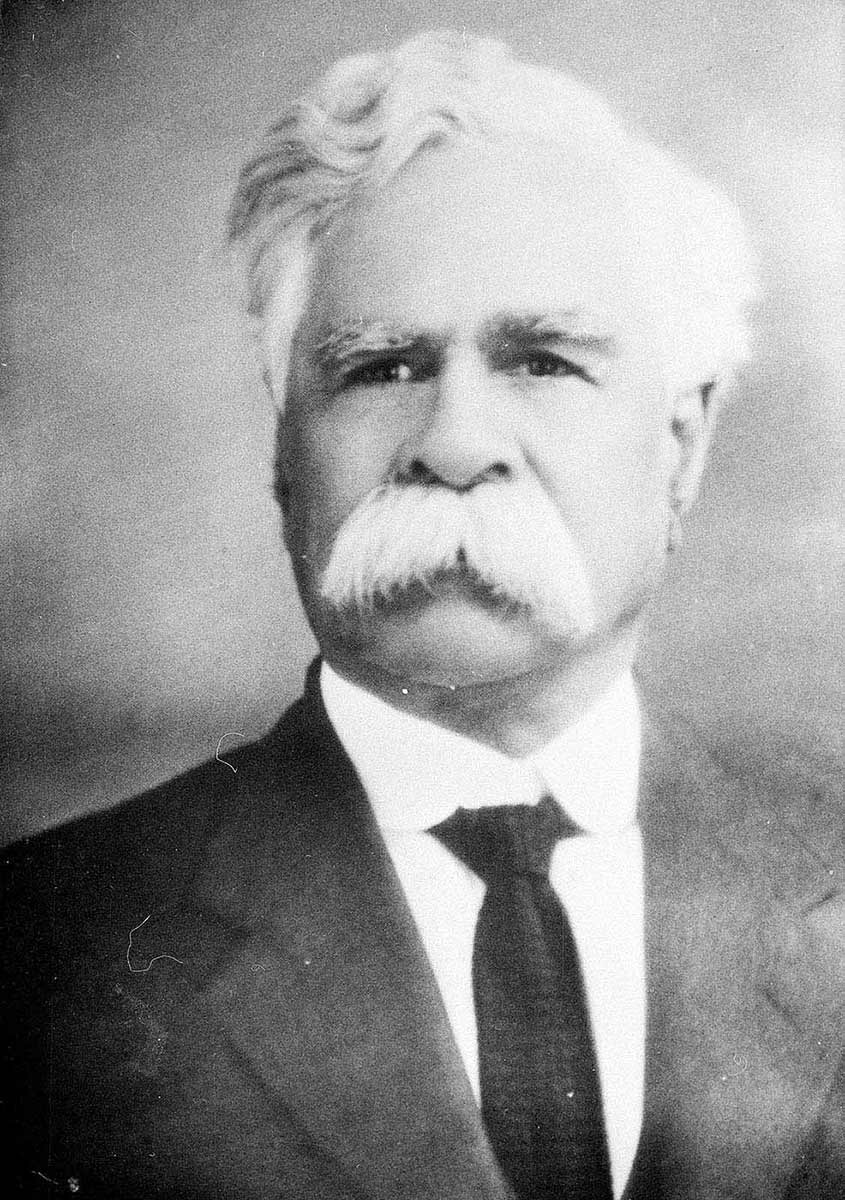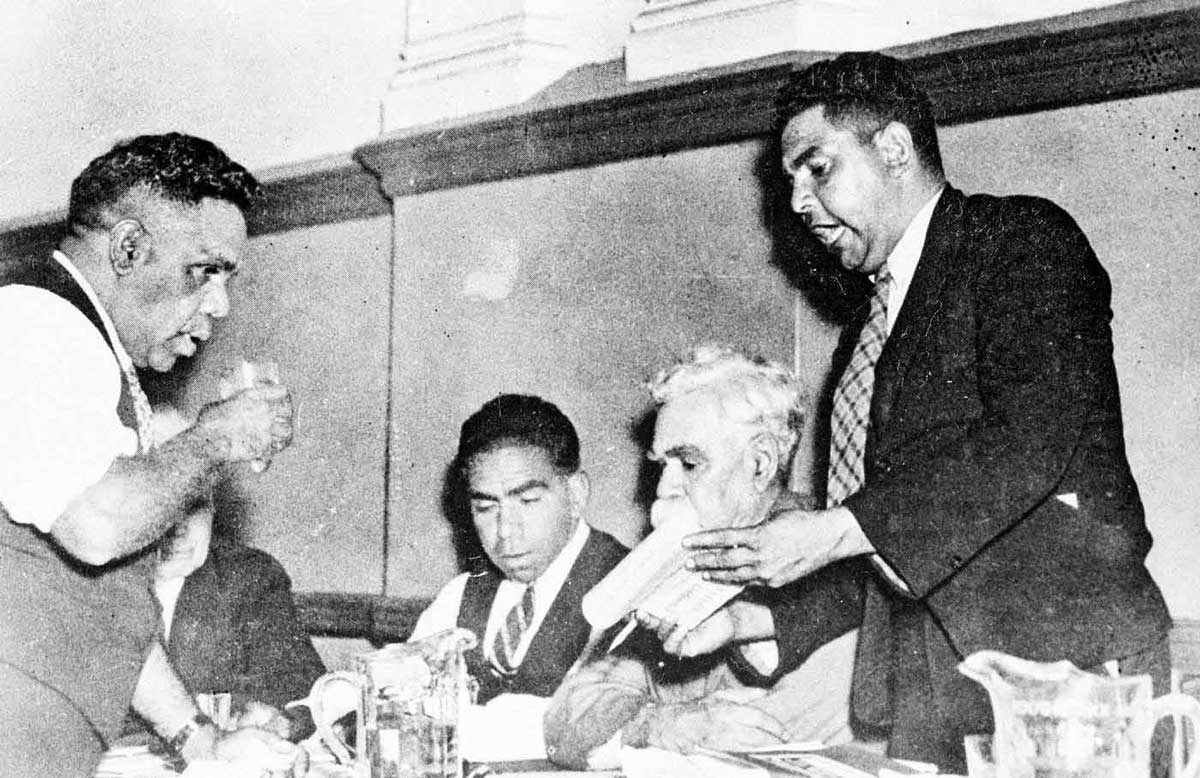William Cooper was an inspirational Aboriginal leader in New South Wales and Victoria in the early part of the 20th century and a founding secretary of the Australian Aborigines’ League.
The league was created to lobby state and federal governments on behalf of Aboriginal people.
The powerful symbolic gesture of a Day of Mourning on 26 January, along with a petition to the British monarch calling for Aboriginal representation in federal parliament, inspired generations of activists working for justice for Indigenous Australians.
William Cooper, from 'Petition to the King', Herald, 15 September 1933:
It was not only a moral duty, but also a strict injunction included in the commission issued to those who came to people Australia that the original occupants and we, their heirs and successors, should be adequately cared for. Instead, our lands have been expropriated.
Yorta Yorta country
William Cooper was born in 1861 in Yorta Yorta country near the confluence of the Murray and Goulburn rivers.
The Yorta Yorta people had inhabited the area for thousands of years. With the arrival of white settlers they were dispossessed of their traditional lands and their population was reduced by 85 per cent due to disease and violence.
The Yorta Yorta people eked out an existence on the edges of European settlement. They were relocated to the Maloga Mission on the New South Wales side of the Murray River in 1874.
Cooper resided at Maloga but the community clashed with the mission’s founder, Daniel Matthews, over his authoritarian administration. The Yorta Yorta people moved five kilometres upstream to the new Cummeragunja Mission in 1889.
Cummeragunja
Cooper spent most of the next 44 years around Cummeragunja mission working as a shearer and handyman for pastoral employers. He had a few months of formal schooling in childhood but as an adult attended literacy classes and became a member of the Australian Workers’ Union.
Cooper was politically active and represented Aboriginal communities in northern Victoria and western NSW who were ineligible for government aid during the drought of the 1920s and the Great Depression of the 1930s.
Through his family connections and political acumen, Cooper became a spokesman for the Yorta Yorta in their ongoing battles for land justice with the NSW government.

Australian Aborigines' League
In 1933 at 72 years of age, Cooper moved to Melbourne because as a resident on the reserve he was ineligible for the old-age pension.
He made his home in Footscray which became the centre for other Cummeragunja exiles such as Margaret Tucker, Shadrach James and his grand-nephew, Doug Nicholls.
This group formed the nucleus of the Australian Aborigines’ League (AAL), which was constituted in 1936, although Cooper has made representations to government on behalf of an informal group of the same name for some years prior to that.
The Australian Aborigines' League was created to lobby state and federal governments on behalf of Aboriginal people.
Since September 1933 Cooper had been gathering signatures for a petition to the King asking for, among other things, Aboriginal representation in federal parliament. Despite gathering nearly 2,000 signatures, in February 1938 the Commonwealth formally refused to forward the petition to King George VI.
In 1938 celebrations were planned across Australia to mark the sesquicentenary of the arrival of the British.
In response, William Cooper and the league, along with Bill Ferguson and the newly formed NSW-based Aborigine’s Progressive Association, organised a ‘Day of Mourning’ for 26 January to draw attention to the decimation of Indigenous populations since the arrival of Europeans.
A few days later members of the Australian Aborigines' League and the Aborigine's Progressive Association led a delegation to Prime Minister Joseph Lyons to call for federal control of Aboriginal affairs (although William Cooper had returned to Melbourne by this point). Their entreaties were not acted on.
The powerful symbolic gesture of the Day of Mourning, along with the petition to the King and the formation of the Australian Aborigines' League, have inspired generations of activists working for justice for Indigenous Australians.
Anti-Nazi march
Cooper was not only concerned with the plight of his own people but was moved by the extreme discrimination faced by other oppressed populations.
On 6 December 1938 less than a month after Kristallnacht when Jewish people were targeted in widespread rioting and looting across Germany, Cooper led a march to the German consulate in Melbourne to condemn the, ‘cruel persecution of the Jewish people by the Nazi government in Germany’.
German officials refused to take the written condemnation but the protest is seen by many as the only one of its kind in the world.
Yorta Yorta land claim
The political activism that William Cooper displayed is still active in the Yorta Yorta community.
The settlement of the 1992 Mabo case led to the development of the Native Title Act. The Yorta Yorta people in 1994 became one of the first indigenous groups to make a native title claim.
Although the High Court eventually dismissed the claim, the Yorta Yorta native title case created key precedents on how the court system would interpret evidence required to prove native title.
In 2004 the Victorian Government entered into a cooperative management agreement with the Yorta Yorta people over public lands that formed part of the native title claim area.
In our collection
Explore Defining Moments
References
Bain Attwood and Andrew Markus, Thinking Black: William Cooper and the Australian Aborigines' League, Aboriginal Studies Press, Canberra, 2004.
